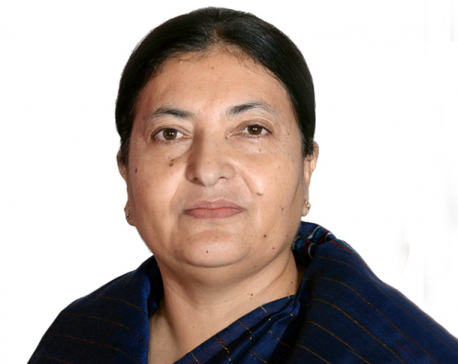
OR
Valley horn ban
The government’s ‘No horn’ rule for Kathmandu valley that came into force on April 14, the Nepali New Year, is a wonderful initiative. Some may say it is unnecessary and unrealistic. Unnecessary because there are seemingly more pressing traffic priorities, for instance controlling the alarming level of air pollution, which is largely a result of unmonitored vehicle exhaust. Unrealistic because how can you stop people from honking, something they have been used to for many-many years, almost overnight? We on the other hand see it as a great initiative to control noise pollution, at a time when we have been unable, for various reasons, to check pollutions of other kinds. More than its utilitarian value, it’s also a matter of inculcating good civic sense. Traffic jams in Kathmandu are already hellish, with dust everywhere and vehicles belching copious amounts of noxious chemicals.
They are made worse by the relentless aural assault of vehicles, as if just sounding the horn will somehow clear the jam. Our public buses and microbuses are especially notorious for their mistimed toots. Motorcycle users, for their part, like to weave and squeeze through every little space on the road, always using their horns to declare their intention to whizz past. So honking had become a public nuisance in Kathmandu.
Nor is the anti-horn campaign impractical. In anticipation of the Baishak 1st ban, many vehicle users have already started to limit the use of their horns. If you honk for a little too long, or when it’s out of place, people glare at you. Just like bad habits can be learned, good habits can be too. The international practice is that horns should be used only in emergencies and only by certain vehicles on emergency duties. They are not meant to be used at the discretion of vehicle owners. Such a ban had become important also because people openly horned even in sensitive areas like hospitals, where the use of horns has always been banned. Again, this bad habit can be unlearned and the new horn-ban is just the right nudge. Even when the traffic police started its zero-tolerance campaign against drunk-driving, many people had called it impractical. People drink for religious reasons; there is no harm in drinking within limits; there are not enough breathalyzers; it is a draconian policy—many such excuses were offered for why the zero-tolerance policy was impractical and would thus fail.
But the anti-alcohol campaign has been a resounding success, with which the traffic police have been able to prevent hundreds of road deaths and countless more injuries from drunk driving every year. We would thus like to wish the Metropolitan Traffic Police Department (MTPD) and the Kathmandu Metropolitan City (KMC) that have been jointly entrusted with imposing the horn-ban the very best of luck. Let us hope they will enact their part well. But it is also the responsibility of all Kathmandu residents to help the traffic police with the ban’s implementation. We are rather quick to point an accusing finger at government authorities when they do something wrong. Let us also not be miser in praising and helping them when they are doing something good.
You May Like This

Bhandari breaks her silence on Dashdunga mishap first time after becoming President
MORANG, March 30: President Bidya Devi Bhandari has broken silence on Dashdhunga accident saying that it is unfortunate not to... Read More...

Army, Golden Gate into final
KATHMANDU, March 29: The departmental team Tribhuvan Army Club and Golden Gate International College are set to vie for the... Read More...

Golden 1,000 Days project only leaves target women in debt
HARKATTI, July 8: Nitu Devi Mandal is one of the target women of the Golden Thousand Days (Sunaula Hazar Din)... Read More...




Just In
- Kushal Dixit selected for London Marathon
- Nepal faces Hong Kong today for ACC Emerging Teams Asia Cup
- 286 new industries registered in Nepal in first nine months of current FY, attracting Rs 165 billion investment
- UML's National Convention Representatives Council meeting today
- Gandaki Province CM assigns ministerial portfolios to Hari Bahadur Chuman and Deepak Manange
- 352 climbers obtain permits to ascend Mount Everest this season
- 16 candidates shortlisted for CEO position at Nepal Tourism Board
- WB to take financial management lead for proposed Upper Arun Project






_20220508065243.jpg)








Leave A Comment